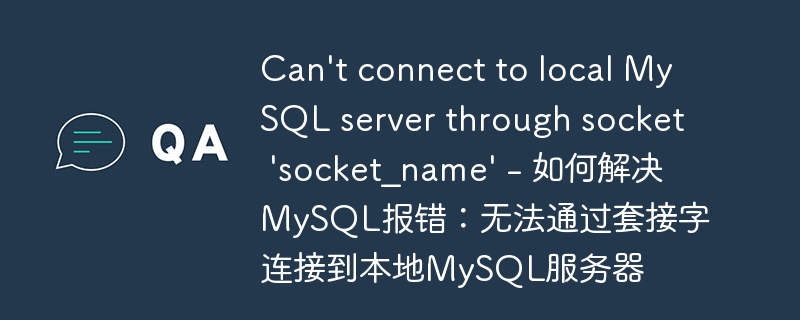

Can't connect to local MySQL server through socket 'socket_name' - How to solve the MySQL error: Unable to connect to the local MySQL server through socket, specific code examples are needed
When using MySQL, you may sometimes encounter a common error, namely "Can't connect to local MySQL server through socket 'socket_name'", which in Chinese means "Can't connect to local MySQL server through socket 'socket_name'". . This error usually occurs when trying to connect to a local MySQL server and MySQL cannot find the specified socket file. This article will detail the causes of this error and how to resolve it.
Cause of the problem:
This error is usually caused by the following reasons:
sudo service mysql start (linux system) or net start mysql (Windows system) on the command line. /etc/mysql/my.cnf or /etc/my.cnf). /var/run/mysqld/mysqld.sock) has been deleted or moved to another location, This will cause a connection error. The workaround is to specify the correct socket file location in the MySQL configuration file. How to solve this problem:
There are several ways to solve this problem. Two common solutions are listed below:
Method 1: Check MySQL Service status and configuration file
First, make sure that the MySQL service has been started. You can use the following command to check the status of the MySQL service:
sudo service mysql status (linux system) net start mysql (Windows System) If the MySQL service does not start, use the following command to start it:
sudo service mysql start( linux system)net start mysql(Windows system)Then, check the location of the socket file in the MySQL configuration file . You can use the following command to open the configuration file:
sudo nano /etc/mysql/my.cnf (linux system) notepad C:ProgramDataMySQLMySQL Server The socket path in line ## matches the actual path. If it doesn't match, modify it based on the actual socket file location. Finally, restart the MySQL service for the changes to take effect:
sudo service mysql restart
Try to reconnect to MySQL server and see if the problem is resolved. In addition to specifying the location of the socket file by editing the configuration file, you can also specify the socket location directly in the code. The following is an example of a Python script using MySQL that demonstrates how to specify a socket location through code: [mysqld] socket = /var/run/mysqld/mysqld.sock
,
user, and
passwordparameters in the above example to the correct values to suit your situation.
Conclusion: When the "Can't connect to local MySQL server through socket 'socket_name'" error occurs, first make sure that the MySQL service has been started. Then, check that the socket file location in the MySQL configuration file is correct. If the socket file has been deleted or moved, you can specify the correct socket location by editing the configuration file. Additionally, you can resolve connection errors by specifying the socket location in your code. Hope this article will help you solve MySQL connection error problem.
The above is the detailed content of Can't connect to local MySQL server through socket 'socket_name' - How to solve MySQL error: Can't connect to local MySQL server through socket. For more information, please follow other related articles on the PHP Chinese website!




